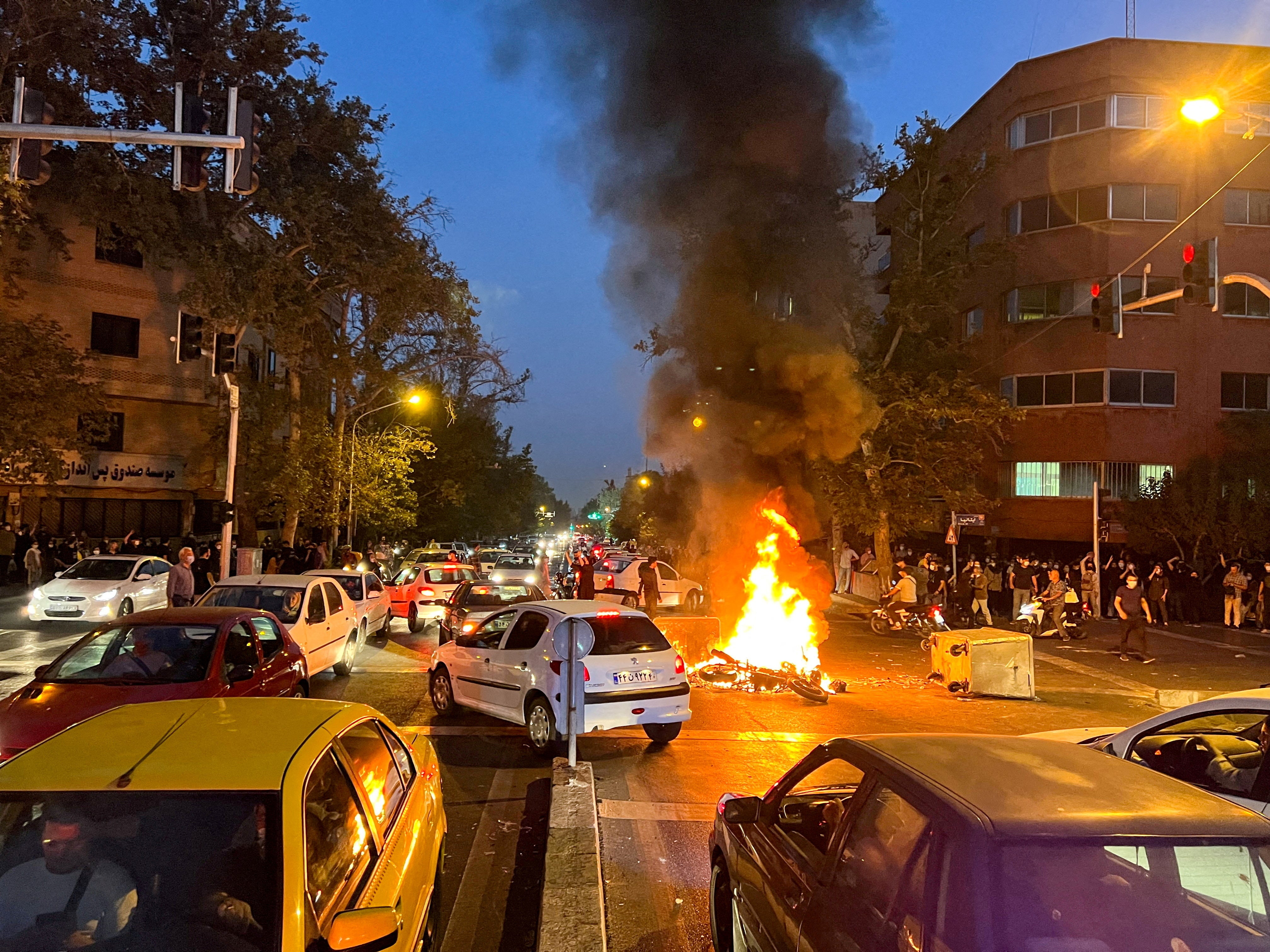
Iranian state media has rejected reports that the regime is abolishing the morality police tasked with enforcing its strict dress code, in the face of furious protests over the death of 22-year-old Mahsa Amini in its custody.
Such a concession would mark a significant victory for demonstrators demanding greater freedoms for women and posing the largest threat to the regime since the Islamic Revolution in 1979.
But the suggestion of the morality police’s abolition stems from Western reporting of remarks made by the country’s attorney general and has not been confirmed by the interior ministry, which controls the force known formally as Gasht-e Ershad.
Asked by a reporter at a religious conference this weekend why the guidance patrol had been shut down, Isna news agency quoted Mohammad Jafar Montazeri as saying: “The guidance patrol has nothing to do with the judiciary, and it was closed by the same authority which established it in the past.”
“Of course, the judiciary continues to monitor behavioural actions at the community level,” he added.
Protesters and journalists have reacted with scepticism to the significance of the remarks, pointing to the fact that a state broadcaster has since denied that the morality police is being abolished and that the force has largely halted its patrols since mass protests began 70 days ago.
Some Iranians branded the news “propaganda” serving only the regime, with hundreds of citizens having died and thousands arrested by security forces in recent weeks, regardless of the morality police’s inaction.
“Iran’s attorney general has made some ambiguous statements that could possibly be construed as an end to the morality police but may also suggest that the judiciary wants to disassociate itself from the institution. Statements cited in press do not equal a change in policy,” The Independent’s international correspondent Borzou Daragahi said on Twitter.
He added: “In more than 20 years of covering Iran, nothing has ever been clear-cut and unambiguous. A convoluted quote by a second-tier official means almost nothing. There’s been no statement by the [Supreme National Security Council]. There has been no report from Majlis. There’s been nothing from the president.”
Iranian journalist and activist Masih Alinejad also wrote: “Abolishing morality police in Iran is disinformation but it shows the fear of the regime.”

State-owned broadcaster Al Alam said foreign media were depicting the attorney general’s comments as “a retreat on the part of the Islamic republic from its stance on hijab and religious morality as a result of the protests”, but that all that could be understood from his comments was that the morality police were not directly related to the judiciary.
The force was set up by Iran’s Supreme Council of the Cultural Revolution at the beginning of hardline president Mahmoud Ahmadinejad’s eight-year rule, and it began patrols in 2006 in order to “spread the culture of modesty and hijab” – which became mandatory in 1983.
But mass protests have been sweeping the country since mid-September, with many women taking the extraordinary step of risking arrest by removing their hijabs in public – and then burning them – while calling for an end to Tehran’s clerical dictatorship.
As authorities scramble in vain to suppress the unprecedented demonstrations, Mr Montazeri was reported by AFP as saying the previous day that “both parliament and the judiciary are working” on the issue of whether the law requiring women to cover their heads should be changed.
Iran’s republican and Islamic foundations are constitutionally entrenched “but there are methods of implementing the constitution that can be flexible”, President Ebrahim Raisi said in televised comments the same day, according to AFP.
Clothing rules had relaxed slightly in Iran under former president Hassan Rouhani, but in July – 11 months after taking office – his successor Mr Raisi called for the mobilisation of “all state institutions to enforce the headscarf law”, claiming that “the enemies of Iran and Islam have targeted the cultural and religious values of society by spreading corruption”.
Just two months later, Amini died in custody after being arrested for wearing her hijab too loosely, sparking fury among compatriots who believe her death came after she was beaten by morality police – which Tehran denies – in a situation all too familiar to many of Iran’s citizens.
The demonstrations have now been raging for 10 weeks, and have seen citizens clash with police across the country, even at points seizing effective control of cities and setting fire to the ancestral home of the founder of the Islamic republic, Ayatollah Khomeini.
At least 470 protesters have been killed by security forces, 64 of them under the age of 18, while more than 18,200 people have been arrested, the activist Hrana news agency reports. In the first official acknowledgement of such a toll, Iran’s Revolutionary Guards said on Tuesday that more than 300 people had died.
While a significant concession, disbanding the morality police alone would fall considerably short of citizens’ demands for an end to the Islamic republic.
“Just because the government has decided to dismantle morality police it doesn’t mean the protests are ending,” one Iranian woman told the BBC World Service.
“Even the government saying the hijab is a personal choice is not enough. People know Iran has no future with this government in power. We will see more people from different factions of Iranian society, moderate and traditional, coming out in support of women to get more of their rights back.”







